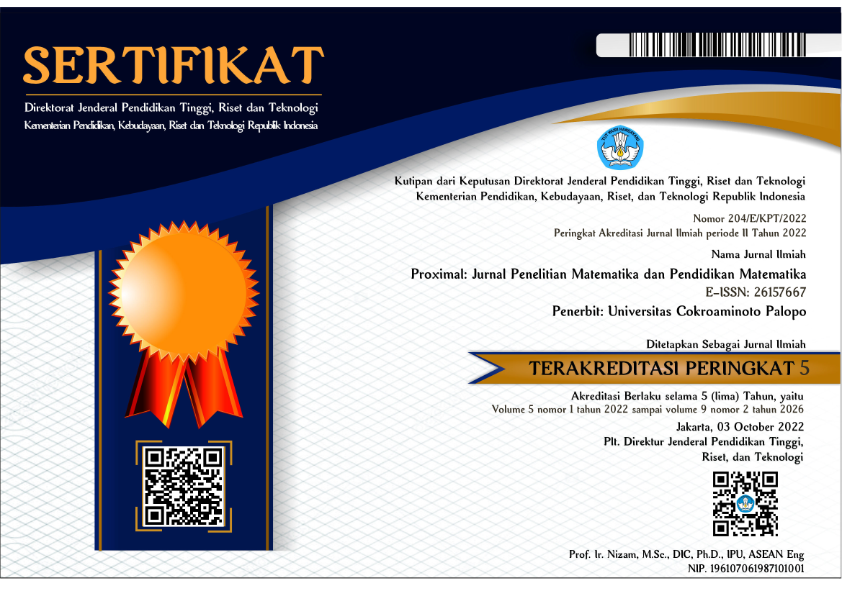Pengembangan Alat Peraga Pembelajaran Berbasis Etnomatematika Pada Rumah Gadang di Kelas IX SMPN 3 Mapat Tunggul Kabupaten Pasaman Tahun Pelajaran 2022/2023
DOI:
https://doi.org/10.30605/proximal.v7i2.3667Keywords:
Ethnomathematics, Learning ToolsAbstract
This research was motivated by the problems found in grade IX SMPN 03 Mapat Tunggul, namely the lack of learning media, the teaching aids used were not cultural-based, the teaching aids in schools were teaching aids that were not in accordance with the characteristics of students, resulting in students finding it difficult to understand the mathematical concepts learned. This research is a development research or Research and Development ( R & D ) with the development model Hannafin & Peck. Based on the development research that has been done, props were obtained with a very valid criterion of 82.33%, for the level of practicality is on a very practical criterion of 88.25%, for the level of effectiveness is on a very effective criterion of 80.95%. So it can be concluded that the Ethnomathematics-Based Mathematics Learning Aids at Rumah Gadang in grade IX SMPN 03 Mapat Tunggul Pasaman Regency for the 2022/2023 academic year that were developed are valid, practical, and effective.
Downloads
References
Azhar, Riska luthfia erva, dkk. 2022. Pengeruh Penggunaan Modul Pembelajatan Matematika Berbasis Etnomatematika Melalui Pendekatan Saintifik Terhadap Hasil Belajar Siswa. Jurnal Pendidikan Guru Sekolah Dasar, Vol. 11 No. 2.
Arsyad, Azhar. 2015. Media Pembelajaran. Jakarta: Rajawali Pers.
Erva, R. A. L., Rosianawati, A., Pardimin, P., Nisa, A. F., & Irfan, M. (2022). Pengaruh Penggunaan Modul Pembelajaran Matematika Berbasis Etnomatematika Melalui Pendekatan Saintifik Terhadap Hasil Belajar Siswa the Effect of Using Ethnomathematical-Based Mathematics Learning Modules Through a Scientific Approach on Students’ Learning. Primary: Jurnal Pendidikan Guru Sekolah Dasar, 11(2), 491-499. DOI: https://doi.org/10.33578/jpfkip.v11i2.8676
Mustika, Zahara. "Urgenitas media dalam mendukung proses pembelajaran yang kondusif." CIRCUIT: Jurnal Ilmiah Pendidikan Teknik Elektro 1.1 (2015). DOI: https://doi.org/10.22373/crc.v1i1.311
Hamzah, Ali. 2014. Evaluasi Pembelajaran Matematika. Jakarta: PT Raja Grafindo Persada.
Kamal, M, dkk, Penerapan Permainan Tradisional “Manjalo” Sebagai Upaya Menumbuhkan Keterampilan Sosial Anak Sejak Dini, Jurnal Edicative: Journal of Educational Studies Vol.1, No.1, Januari-Juni 2016
Nur Pratama, A. G. U. N. G., Qudsiyah, K., & Mulyadi, M. (2024). Eksplorasi Etnomatematika Situs Sejarah Museum Song Terus (Doctoral dissertation, STKIP PGRI PACITAN).
Prastowo, A. (2014). Pemenuhan kebutuhan psikologis peserta didik SD/MI melalui pembelajaran tematik-terpadu. Jurnal Pendidikan Sekolah Dasar Ahmad Dahlan, 1(1), 1-13. DOI: https://doi.org/10.26555/jpsd.v1i1.a538
Rita Silvia, Hasil Belajar Matematika Siswa Dengan Menggunakan Alat Peraga Mistar Hitung Dan Setting Kelompok Pada Pembelajaran Matematika Di Kelas VII SMP N 1 V Koto Kampung Dalam Pariaman, (skripsi: IAIN Bukittinggi, 2018), hal 98
Sudjana, Nana. 2013. Dasar-Dasar Proses Belajar Mengajar. Bandung : Sianar Baru Algensindo.
Sugiono. 2017. Metode Penelitian Pendidikan Kuantitatif, Kualitatif, Dan R&D. Bandung: Alfabeta.
Wahyuni, A., Tias, A. A. W., & Sani, B. (2013, November). Peran etnomatematika dalam membangun karakter bangsa. In Makalah Seminar Nasional Matematika dan Pendidikan Matematika, Prosiding, Jurusan Pendidikan Matematika FMIPA UNY, Yogyakarta: UNY (Vol. 1, No. 1, pp. 114-118).
Siregar, Pengembangan Lembar Kerja Peserta Didik (LKPD) Berbasis Etnomatematika Pada Rumag Gadang Di Kelas IX SMPN 1 Luhak Nan Duo Tahun Pelajaran 2020/2021, (skripsi : IAIN Bukittinggi, 2021) hal. 117
Downloads
Published
How to Cite
Issue
Section
License
In submitting the manuscript to the journal, the authors certify that:
- They are authorized by their co-authors to enter into these arrangements.
- The work described has not been formally published before, except in the form of an abstract or as part of a published lecture, review, thesis, or overlay journal.
- That it is not under consideration for publication elsewhere,
- That its publication has been approved by all the author(s) and by the responsible authorities – tacitly or explicitly – of the institutes where the work has been carried out.
- They secure the right to reproduce any material that has already been published or copyrighted elsewhere.
- They agree to the following license and copyright agreement.
License and Copyright Agreement
Authors who publish with this journal agree to the following terms:
- Authors retain copyright and grant the journal right of first publication with the work simultaneously licensed under Creative Commons Attribution License (CC BY 4.0) that allows others to share the work with an acknowledgment of the work's authorship and initial publication in this journal.
- Authors are able to enter into separate, additional contractual arrangements for the non-exclusive distribution of the journal's published version of the work (e.g., post it to an institutional repository or publish it in a book), with an acknowledgment of its initial publication in this journal.
- Authors are permitted and encouraged to post their work online (e.g., in institutional repositories or on their website) prior to and during the submission process, as it can lead to productive exchanges, as well as earlier and greater citation of published work.















